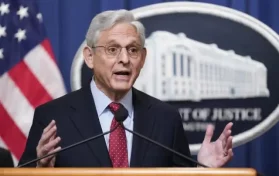
On Monday, President Donald Trump announced that his home in Florida, Mar-a-lago, had been raided by the FBI. Purportedly, the agents were looking for documents that some say belong in the National Archives; sources said that the raid had nothing to do with the January 6 committee. President Trump was away at the time; he had been in New York on Monday.
Many legal scholars are calling the raid “unprecedented;” others say that the raid is cause for great alarm. Alan Dershowitz, who was on Trump’s first impeachment legal team, said that the raid was “totally unjustified,” noting that Trump being away should have been an indication that he had had no intention of destroying the supposed documents.
The unconstitutional Trump raid: it could happen too u!
— Alan Dershowitz (@AlanDersh) August 9, 2022
Watch todays Dershow live on Rumble @ 5:30 pm est to see what I have to say. Leave a question or a comment in the chat. This is going to be a hot one.https://t.co/DRb4klmRWo
Jonathan Turley, a George Washington University law school professor, pointed to the Presidential Records Act; he said that even in the most “egregious” of cases, no case such as this is ever handled as if it is a criminal case.
Turley used the case of former Clinton NSA Advisor Sandy Berger as an example. Berger was prosecuted for removing five copies of a report that detailed the Clinton administration’s handling of “a series of unsuccessful terror attacks planned by al Qaeda.” Berger had stuffed the copies in his socks and pants. In Berger’s case, once he was convicted, his only punishment was being stripped of his security clearance for three years and two years’ probation.
It’s no secret that the National Archives has sought to retrieve documents they believed pertained to Trump’s administration; in February, Trump gave the National Archives fifteen boxes of documents.
Trump claimed Monday night that he had worked with the National Archives, and that the raid was “not necessary nor appropriate.”
Robert Leider, an assistant professor at George Mason University, agreed with the sentiments of both Dershowitz and Turley: “To get a warrant, prosecutors would need probably cause to believe that a crime has been committed and that the search would turn up evidence or fruits of the crime at the location of the search.”
Experts also share that the U.S. Attorney General, Merrick Garland, would have to approve the search warrant on a former president, and the warrant in question would need to be specific about any crimes they believed had taken place.
Jonathan Turley called on the Justice Department to be transparent about the reasoning behind the raid. Dershowitz said that it is possible that some of the documents seized on Monday were already declassified, and that FBI agents might have seized these documents improperly.
Yet other legal scholars said that since Trump has previously handed over documents that a simple subpoena would have sufficed. Instead, the raid was carried out with armed agents.
Many of the GOP in Washington have criticized the move as well. House Minority Leader Kevin McCarthy (R-CA) tweeted that Merrick Garland needed to “keep his documents and clear his calendar” should the GOP retake the House and Senate in the upcoming midterms. GOP Senator Tom Cotton tweeted that the Justice Department has “weaponized (its staff) against his political opponents.” Marsha Blackburn, Tennessee Senator, tweeted, “This isn’t how a justice system should operate, and it should outrage every American.”
Attorney General Garland: preserve your documents and clear your calendar. pic.twitter.com/dStAjnwbAT
— Kevin McCarthy (@GOPLeader) August 9, 2022
Former Clinton lawyer Mark Elias said that this could keep Trump from running for president again in 2024; many political pundits claim that this raid is merely a ploy to keep Trump from running again. Trump teased this weekend at the CPAC conference that an announcement regarding a potential run is forthcoming.
Elias pointed to U.S. Code Title 18, Section 2071. To paraphrase, the code holds that one who has “the custody of . . . any such . . .document and unlawfully conceals . . . or destroys the same may not be eligible to run for any office in the United States government. The National Archives claims that some of the documents in the fifteen boxed Trump handed over earlier this year were “classified” out of concern over “national security.”
The raid garnered masses of Trump supporters outside his Mar-a-lago home Monday evening, and many Americans on social media were critical of the raid.





